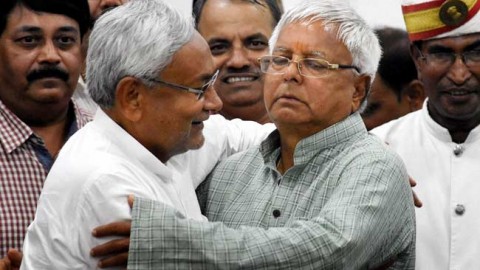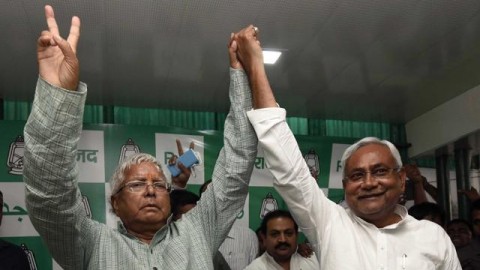Two events have progressed over the last few months that have caught the amazement of the world. The obvious reference is to the exit of the British from the Union and the rise and rise of Donald Trump. One can’t but ponder how significant populations can seem to make choices that so explicitly defy rational sense. The pursuit of self-interest is held to be the central principle of the capitalist model. How, then, did an entire British population fall to half-informed and at times downright false, silly, nationalist rhetoric, which was sure to culminate in Britain emerging more divided, more economically fragile than it already was? How did the entire Republican leadership fail to convince the Republican voter of the disaster that Trump represents for the economy, apart from other things?
The counter-intuitive nature of social choices emerges from a contemporary social design that describes the commonality between the two nations parted by the Atlantic. The shades on the canvas that shows this intersection may differ, but all colors belong to the same kind. The emergence of chauvinism and hate is not spontaneous, but is the inevitable result of the socio-economic order that has long commanded the distribution of social gain, and a politics that has pandered to its ‘invisible’ forces.
When the rules of a game privilege a few and render the rest less well off, discontent is an obvious outcome. Capitalist growth through free markets holds partial responsibility for having brewed some of it.
Writing back in the 1930s, Keynes listed the flaws with capitalism in his General Theory after having dismissed classical economic models lock, stock and barrel. One of his complaints against capitalism was its tendency to result in an unfair and unequal distribution of wealth (Chapter 24). Many contemporary economists however, attempted to synthesize Keynesian thinking into the prevalent classical ideas, and many of the revolutionary aspects of Keynesianism were lost not only from the academic but also from the popular imagination (Minsky).
The inequalising impacts of capitalism have always been felt and Brexit and Trump are only the more visible examples of the social backlash that these impacts are going to generate.
Capital lead growth and liberalization have caused economic equity in the West, and the developing East and South to take a two-fold hit-one is the generation of inequality through concentration of wealth and the perpetuation of such concentration across generations, and the second is the distribution of wage growth across a cross section of income groups. The incidence of the first form of inequity is often seen in the ‘1% own more than half of all wealth’ headlines. The second form of inequality is subtler. As the onset of technology constantly upgrades the skill set required to either escape from its assault or become capable of managing it, those with a lower skill set get displaced. Similarly, those with higher skills are paid much more, and the rate at which the wages of the 90th income percentile rise is seen to be significantly higher than the rate at which the incomes of the 50th income percentile rise.
A third aspect of the inequality caused by globalization is seen in the general slowdown in wage growth in the developed world imposed due to fear of job flight to developing countries. This accompanied by deunionization of labor, sets the stage for the capitalist to take more than what is due on her or safe for the society. In a previous article I had pointed to the possibility of a fall in US non-accelerating inflation rate of unemployment (‘Tightening the Belt’). This doesn’t augur particularly well for income-earners, as it points towards a fall in the bargaining power of labor relative to capital. In economic jargon, it points to a possible flattening of the Phillips curve, meaning that even at low unemployment rates, inflation does not accelerate as wage growth experiences downward pressure resulting from fear of job flight, deunionization, technology, etc. This aspect has been under discussion among researchers in the present times.
Unhindered affluence for one small part of society doesn’t sit well with the other large part, and with good reason. The social impacts of inequality are more destabilizing, when those who are condemned to the lower rung haven’t always been there, and aspire to a more wealthy life. However, it is not just the aspiration for a better life that produces discontent.
The rapidly changing nature of the labor market-thanks to the advent of technology, deunionization, prolonged slumps, etc.- has exposed people to more uncertainty than they can handle. The absence of predictability and stability can have daunting impacts on the psyche of a person.
There is strong basis to suggest that globalization has left Western labor worse off. Stagnating, or in some cases, falling real incomes have become a trend for the bottom 90%. Angus Deaton recently presented findings from his research that showed declining life expectancy among segments of the US white population. But this does not mean that Eastern labor has gained (we shall not open that discussion in this article). Neither does this mean that immigration is to blame, since globalization would typically lead to an equalization of wages whether immigration happened or not. Immigration has actually aided the aging Western labor force by raising productivity and expanding the domestic market, apart from bringing the best of scientists to Western labs.
All of these legitimate deficits are channeled by populists who give vent to the collective anger of the society in ugly ways. It is human nature to seek answers, but more often than not, the hunt for answers transforms into a hunt for scapegoats. And scapegoating must accompany hate.
Several commentators have suggested that Brexit has been the result of ‘too much democracy’. There are indeed legitimate arguments against the process of referendum, however to the extent that the will of the people has been ultimately reflected, democracy has been upheld. This rather authoritarian argument needs to be dumped, for discontent does not disappear only because its expression was scuttled. Brexit reflects the major problems with the way institutions and systems have come to be organized, and speaks volumes of how the losers from contemporary prosperity can prove dangerous to the society. It is a wake-up call to capitalists and politicians alike. Labor wants to have a fair share of the profit. People want to have a more affordable education for their kids, so that they can protect their livelihoods from the assaults of laborsaving technology. They are angry, and their anger finds the wrong targets in migrants, blacks and Muslims, who thanks to the circumstances become responsible for all that is going wrong.
As for countries like ours, Brexit as well as Trump must exemplify that prosperity and growth do not inevitably bring social harmony, peace and happiness. How the gains from growth are distributed matters as much, if not more. Similarly, there is no perfect socio-economic order that has ever evolved and a blind imitation of the ways of the West is as foolish as putting in place a dictatorship of the proletariat. The markets do not provide a silver bullet to the problems of the world. Systems need to evolve and be integrated, with a greater deal of public action and intervention to complement the markets and correct what they end up doing wrong. The crony nexus between the capitalists and politicians will have to break and that will require a more assertive population, and a great deal more of democracy, as against any less of it.








